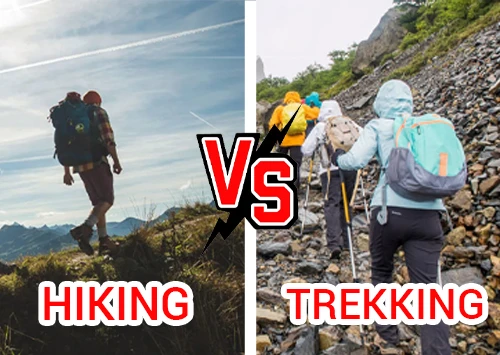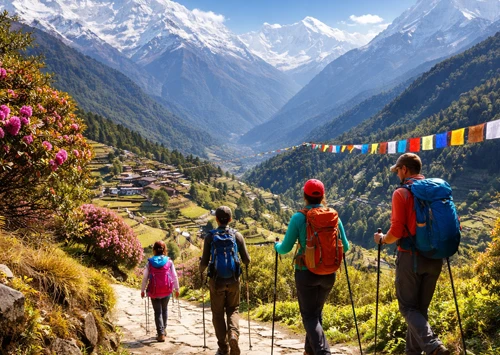The Truth About Altitude Sickness on Everest Helicopter Tours.
Are you planning an Everest Helicopter Tour? Learn about the risks of altitude sickness and how to prevent it before you go.
Altitude sickness can affect anyone traveling to high altitudes, including those taking an Everest Helicopter Tour. Understanding the symptoms and risks of altitude sickness, as well as ways to prevent it, is important for having a safe and enjoyable trip.

Preparing for an Everest Helicopter Tour.
If you’re planning an Everest Helicopter Tour, it’s important to prepare for the risks of altitude sickness. This can include spending a few days at a lower altitude to acclimatize, staying hydrated, avoiding alcohol and caffeine, eating light, high-carbohydrate meals, and potentially taking medication to prevent altitude sickness. By taking these steps, you can help ensure a safe and enjoyable experience on your tour.
Preparing for an Everest Helicopter Tour involves several important steps to ensure a safe and enjoyable experience. Here are some tips to help you prepare:
- Consult Your Doctor: Before embarking on an Everest Helicopter Tour, it's important to consult your doctor to ensure that you are in good health and able to handle the high altitude. They may recommend vaccinations, medications, or other precautions to take before your trip.
- Dress Appropriately: Dress in layers to prepare for changing temperatures at high altitudes. Wear comfortable, breathable clothing, and sturdy shoes with good traction.
- Stay Hydrated: Drink plenty of water and fluids to stay hydrated at high altitudes. Avoid alcohol and caffeine, which can dehydrate you.
- Acclimate to The Altitude: If possible, spend a few days acclimatizing to the altitude in Kathmandu or a nearby location before the Helicopter Tour. This can help reduce the risk of altitude sickness during the tour.
- Choose a Reputable Tour Operator: Research tour operators and choose a reputable one with a good safety record. Look for reviews and recommendations from previous customers and ensure that the operator is licensed and insured.
- Check the Weather Forecast: The weather in the Everest Region can be unpredictable, so check the forecast before your tour to ensure that you choose a day with clear and stable weather.
- Follow Safety Protocols: During the tour, listen to your pilot or guide and follow all safety protocols. This includes wearing safety equipment and following instructions during takeoff, landing, and in-flight.
Overall, preparing for an Everest Helicopter Tour involves taking proper precautions, acclimating to the altitude, and choosing a reputable tour operator. With proper preparation, you can have a safe and enjoyable experience.
What is altitude sickness?
Altitude sickness, also known as Acute Mountain Sickness (AMS), is a condition that can occur when traveling to high altitudes. It is caused by a lack of oxygen in the air and can affect anyone, regardless of age or fitness level. Symptoms can include headache, nausea, dizziness, and shortness of breath. In severe cases, altitude sickness can lead to more serious conditions such as High-Altitude Pulmonary Edema (HAPE) or High-Altitude Cerebral Edema (HACE).
Acute Mountain Sickness (AMS).
AMS is the most common type of altitude sickness, and it occurs when your body doesn't adjust to the lower oxygen levels at high altitudes. Symptoms can include headache, nausea, dizziness, fatigue, and shortness of breath.
High Altitude Pulmonary Edema (HAPE).
HAPE is a more severe form of altitude sickness, and it occurs when there is a buildup of fluid in the lungs. Symptoms can include difficulty breathing, coughing up pink or frothy sputum, fatigue, and chest tightness.
High Altitude Cerebral Edema (HACE).
HACE is the most severe form of altitude sickness, and it occurs when there is a buildup of fluid in the brain. Symptoms can include headache, confusion, difficulty walking, hallucinations, seizures, and coma.
It's important to recognize the symptoms of altitude sickness and take proper precautions to prevent it. This includes acclimatizing to the altitude, staying hydrated, avoiding alcohol and caffeine, and taking medication as recommended by a doctor. If you experience severe symptoms of altitude sickness, it's important to seek medical attention immediately.
Symptoms of altitude sickness.
The symptoms of altitude sickness can vary from person to person, but common signs include headache, nausea, dizziness, fatigue, and shortness of breath. These symptoms can start to appear as early as six to 12 hours after arriving at high altitude and can worsen over time. In severe cases, altitude sickness can lead to more serious conditions such as High-Altitude Pulmonary Edema (HAPE) or High-Altitude Cerebral Edema (HACE), which require immediate medical attention. It’s important to be aware of the symptoms and take preventative measures to avoid altitude sickness while on an Everest helicopter tour.

How to prevent altitude sickness.
There are several ways to prevent altitude sickness while on an Everest Helicopter Tour. First, it’s important to acclimatize properly by spending a few days at a lower altitude before ascending to higher elevations. Additionally, staying hydrated and avoiding alcohol and caffeine can help prevent dehydration, which can worsen altitude sickness symptoms. It’s also recommended to eat light, high-carbohydrate meals and avoid heavy, fatty foods. Finally, some travelers may benefit from taking medication such as acetazolamide to help prevent altitude sickness. It’s important to consult with a healthcare provider before taking any medication.
What to do if you experience altitude sickness during the tour.
If you experience symptoms of altitude sickness during your Everest Helicopter Tour, it’s important to notify your guide immediately. They may recommend descending to a lower altitude or providing oxygen to help alleviate symptoms. It’s important to take altitude sickness seriously, as it can lead to more serious health complications if left untreated. Be sure to follow your guide’s instructions and take any necessary precautions to ensure your safety.
If you experience symptoms of Altitude Sickness During an Everest Base Camp Helicopter Tour, it's important to take immediate action to prevent the symptoms from getting worse. Here are some steps you can take:
- Inform Your Pilot or Guide: As soon as you start to experience symptoms of altitude sickness, notify your pilot or guide immediately. They can provide you with assistance and advice on how to proceed.
- Descend to a Lower Altitude: If your symptoms are severe, your pilot or guide may advise you to descend to a lower altitude to receive medical treatment. This may involve landing the helicopter at a lower altitude or returning to a lower altitude by helicopter.
- Rest and Hydrate: If you experience mild symptoms of altitude sickness, such as headache or dizziness, it's important to rest and hydrate. Drink plenty of fluids, and avoid alcohol and caffeine.
- Consider medication: If you have a history of altitude sickness or are particularly susceptible to it, you may want to consider taking medication to prevent or alleviate symptoms. Talk to your doctor before your trip to discuss your options.
- Seek Medical Attention: If your symptoms are severe or do not improve with rest and hydration, seek medical attention immediately. This may involve returning to Kathmandu or seeking treatment at a local medical facility.
Taking altitude sickness seriously is important, as it can be a life-threatening condition. Be aware of the symptoms, take proper precautions to prevent it, and seek medical attention if necessary.
Explore our Everest Heli Tour Packages
Helicopter Ride From Kathmandu to Lukla - 40 min
Namche to Everest Base Camp Helicopter Tour -1 Day
Rapid Everest Base Camp Trek (Heli flight back to Lukla)
Everest View Trek With Gokyo Helicopter Tour-5 Days





